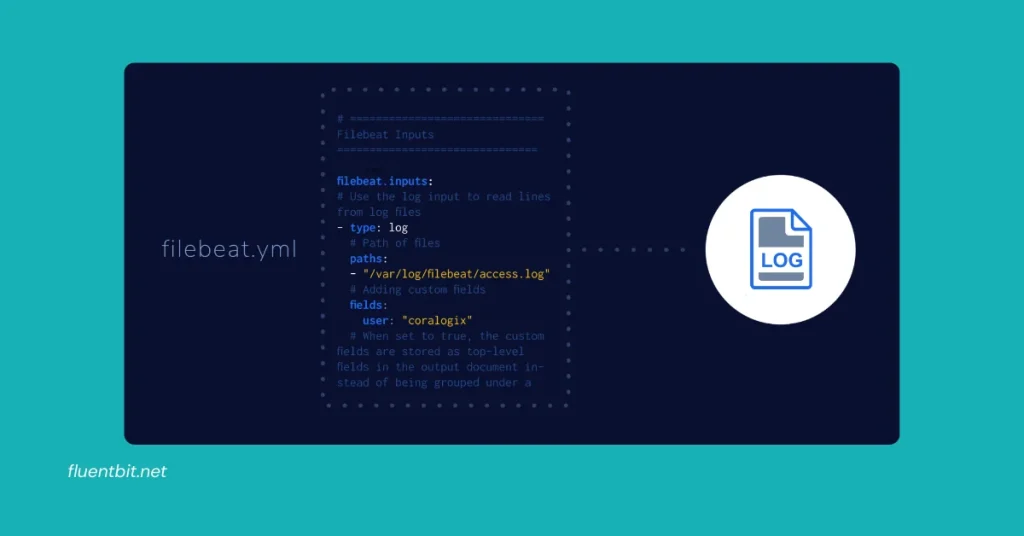Table of Contents
ToggleIntroduction
Log data shippers are software agents that collect, process, and forward log data from various sources to a centralized location for storage and analysis. These tools play a crucial role in modern IT infrastructure by enabling efficient log management and facilitating the monitoring and troubleshooting of systems and applications.
Two popular log data shippers are Fluent Bit vs Filebeat. Fluent Bit is an open-source and multi-platform log processor and forwarder, while Filebeat is a lightweight shipper developed by Elastic that specializes in forwarding and centralizing log data.
Both tools offer unique features and capabilities, making them suitable for different use cases and environments.
In this article, we will explore the importance of log data shippers, compare Fluent Bit vs Filebeat, and discuss their key features, use cases, and performance considerations to help you choose the most suitable tool for your log management needs.

What is Fluent Bit?
Fluent Bit: A lightweight and high-performance log processor and forwarder, designed for cloud-native environments to collect, process, and forward logs with minimal resource usage.
What is Filebeat?
Filebeat: A lightweight log shipper part of the Elastic Stack, designed to collect logs from files and forward them to Logstash or Elasticsearch for centralized logging and analysis.
Key Features of Filebeat
Filebeat, a lightweight shipper, offers essential features that streamline log data collection and forwarding processes. Its key features include:
Lightweight and Resource-Efficient
Filebeat is designed to be lightweight, ensuring minimal impact on system resources while efficiently collecting and forwarding log data.
Optimized for Collecting Log Data
Filebeat excels in collecting log data from various sources, making it a reliable tool for centralizing logs and facilitating efficient log management.
Tight Integration with Elastic Stack
Filebeat seamlessly integrates with the Elastic Stack, including Elasticsearch and Kibana, providing a cohesive log management solution within the Elastic ecosystem.
Benefits of Using Filebeat
Filebeat offers several advantages that make it a preferred choice for log data shipping:
Streamlined Log Collection
Filebeat simplifies the process of collecting log data from different sources, enabling centralized log management and analysis.
Real-Time Data Shipping
With Filebeat’s near real-time log shipping capabilities, users can quickly identify and respond to issues as they occur, enhancing system monitoring and troubleshooting.
Scalability and Customization
Filebeat’s scalability and flexibility allow it to be deployed across multiple systems, making it ideal for large-scale log data collection and analysis.
Drawbacks of Filebeat
While Filebeat is a powerful log data shipper, it does have some limitations:
Limited Data Source Support
Filebeat primarily focuses on log data collection, which may limit its utility for other types of data sources beyond log files.
Reliance on Elastic Stack Ecosystem
Filebeat’s functionality is closely tied to the Elastic Stack ecosystem, requiring integration with Elasticsearch and other Elastic tools for full functionality.
Key Features of Fluent Bit
FluentBit is a powerful log processor and forwarder that offers several key features that make it an attractive choice for log management:
Highly Lightweight and Efficient
Fluent Bit is designed to be lightweight and efficient, making it suitable for use in environments where system resources are limited. This efficiency allows Fluent Bit to handle large volumes of log data without significant performance degradation.
Flexible Data Source Support
Fluent Bit supports a wide range of data sources, including logs, metrics, and other types of data. This flexibility enables Fluent Bit to be used in various scenarios, from simple log collection to complex data processing and analysis.
Vendor-Neutral: Supports Various Outputs
Fluent Bit is a vendor-neutral solution that supports a variety of outputs, including Elasticsearch, Kafka, and many others. This flexibility allows users to choose the best output for their specific needs without being tied to a specific vendor or technology.
Benefits of Using Fluent Bit
Fluent Bit offers several benefits that make it a popular choice for log management:
Streamlined Log Processing
Fluent Bit simplifies the process of collecting, processing, and forwarding log data, making it easier to manage large volumes of log data.
Scalability and Flexibility
Fluent Bit’s flexibility and scalability enable it to be used in a wide range of environments, from small-scale applications to large-scale enterprise systems.
Real-Time Data Processing
Fluent Bit’s ability to process log data in real-time allows users to quickly identify and respond to issues as they occur, enhancing system monitoring and troubleshooting.
Drawbacks of Fluent Bit
While Fluent Bit plugin is a powerful tool, it does have some drawbacks:
Requires More Configuration
Fluent Bit requires more configuration compared to Filebeat, which can be a challenge for users who are not familiar with its configuration options.
Less Intuitive Interface
Fluent Bit’s interface can be less intuitive for some users, particularly those who are used to more straightforward log management tools like Filebeat. This may require additional training or support to effectively use Fluent Bit.
Fluent Bit vs Filebeat: Which Log Shipper is Right for You?
When it comes to choosing between Filebeat and Fluent Bit for your log management needs, several factors should be considered to ensure you select the most suitable tool for your specific requirements.
Let’s explore the key differences and considerations to help you make an informed decision.
Data Source Types
One of the primary factors to consider is the type of data sources you need to collect logs from.
- If your primary focus is on collecting log data from various sources, Fluent Bit may be the better choice as it supports a wide range of data sources, including logs, metrics, and other types of data.
- On the other hand, if your primary focus is on collecting log data from files, Filebeat may be more suitable as it is optimized for collecting log data from files.
Resource Constraints
Another important factor to consider is the resource constraints of your environment.
If you are working in a resource-constrained environment, such as containers or embedded systems, Fluent Bit may be the better choice as it is highly lightweight and efficient, using only 1MB of memory per instance.
Filebeat is also lightweight and resource-efficient, but it may not be as lightweight as Fluent Bit.
Existing Infrastructure
If you are already using the Elastic Stack (Elasticsearch, Kibana, Beats, and Logstash) for your log management needs, Filebeat may be the better choice as it is designed to be an integral part of the Elastic Stack and offers tight integration with Elasticsearch and Kibana.
However, if you are not using the Elastic Stack or prefer a vendor-neutral solution, Fluent Bit may be more suitable as it supports various output destinations, including Elasticsearch, Kafka, and many others.
Use Cases
Finally, consider the specific use cases for each tool. If you need a lightweight tool for collecting and forwarding log data in near real-time, Filebeat may be the better choice.
If you need a more scalable tool that can handle large amounts of log data from different sources, Fluent Bit may be more suitable
Conclusion
In conclusion, both Filebeat and Fluent Bit are powerful log data shippers that play a crucial role in modern IT infrastructure by enabling efficient log management and facilitating the monitoring and troubleshooting of systems and applications.
While both tools share some similarities, such as being lightweight and resource-efficient, they also have distinct differences that make them suitable for different use cases and environments.
Filebeat is an excellent choice for users who are already part of the Elastic Stack ecosystem, as it offers tight integration with Elasticsearch and Kibana, providing a cohesive log management solution. It is also a great option for collecting log data from various sources, particularly log files, and forwarding them in near real-time.
On the other hand, Fluent Bit is a versatile tool that supports a wide range of data sources, including logs, metrics, and other types of data. It is highly lightweight and efficient, making it suitable for use in resource-constrained environments such as containers or embedded systems.
Fluent Bit is also a vendor-neutral solution that supports various output destinations, including Elasticsearch, Kafka, and many others.
FAQs
Q: What is the primary difference between Filebeat and Fluent Bit?
A: The primary difference between Filebeat and Fluent Bit is their focus. Filebeat is designed primarily for collecting log data from files and is tightly integrated with the Elastic Stack, while Fluent Bit is a more versatile tool that supports a wide range of data sources, including logs, metrics, and other types of data.
Q: Which tool is more lightweight and efficient?
A: Fluent Bit is generally considered more lightweight and efficient than Filebeat, using only 1MB of memory per instance. However, both tools are designed to be lightweight and resource-efficient, making them suitable for use in resource-constrained environments.
Q: Which tool is more suitable for use with the Elastic Stack?
A: Filebeat is designed to be an integral part of the Elastic Stack and offers tight integration with Elasticsearch and Kibana. If you are already using the Elastic Stack, Filebeat may be the better choice.
Q: Which tool is more versatile in terms of data sources?
A: Fluent Bit is more versatile in terms of data sources, supporting a wide range of data sources, including logs, metrics, and other types of data. Filebeat is primarily designed for collecting log data from files.
Q: Which tool is more suitable for use in resource-constrained environments?
A: Fluent Bit is generally considered more suitable for use in resource-constrained environments, such as containers or embedded systems, due to its highly lightweight and efficient design.
Latest Post:
- Best Practices for Fluent Bit Output Matching in Complex Pipelines
- Setting Up Fluent Bit with Open Telemetry for Unified Observability
- Fluent Bit vs Fluentd: Choosing the Right Tool for OpenSearch Logging
- How to Use fluent-plugin-opensearch for Fluentd Pipelines
- Is Ansys Fluent Better for Complex Fluid Flow Simulations?












